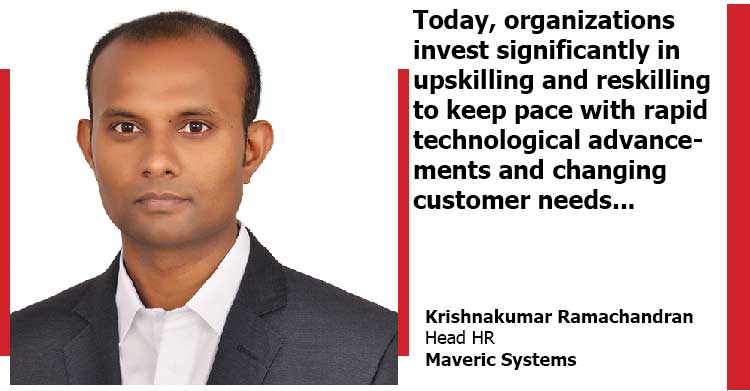Why skilling alone is not enough to build a future-ready workforce? | Krishnakumar Ramachandran | Head HR | Maveric Systems

Today, organizations invest significantly in upskilling and reskilling to keep pace with rapid technological advancements and changing customer needs. However, those neatly designed training decks often fall short of preparing employees for the next business challenge. To be truly future-ready, a workforce needs more than just skills; it requires the right mindset, adaptability, and a willingness to learn and unlearn continuously.
A future-ready associate avoids mediocrity, adopts change, and uses logical thinking to build contextual expertise and stay relevant. Just as important is personal awareness, which is the ability to be authentic, adapt to new situations, and manage personal barriers such as fear and uncertainty. This personal impact is critical in today’s competitive work environment.
As work becomes more collaborative, it’s not just about technical expertise. Success requires strong communication skills, the ability to listen, understand problems, partner with the right stakeholders, drive execution, and manage conflicts effectively. The ability to create value in a team setting is as important as individual performance.
True growth happens when people are encouraged to explore new areas and take on diverse roles. This experiential learning also known as learning by doing, helps build both depth and breadth of knowledge. It creates stronger talent and greater talent density within the organization, compared to focusing only on formal upskilling.
At the heart of experiential learning is layered competency, developing expertise across three key areas:
Domain knowledge
Technology and business understanding
Leadership skills
Mastering these dimensions enables employees to take ownership, be accountable, and solve real-world problems with confidence. Moving individuals across roles and functions helps them gain a broader view of the organization, understand diverse stakeholder needs, navigate different work cultures, and tackle operational challenges more effectively. Over time, they move beyond functional thinking and develop the business acumen needed to create real impact.
Early in their careers, employees may begin with limited responsibilities. But as they grow, opportunities to engage with clients, mentor peers, or contribute to end-to-end solutions help them build strategic thinking, resourcefulness, and leadership capabilities—far more effectively than a standalone training session ever could.
Unfortunately, in many organizations today, learning has become a scheduled event, typically occurring yearly or quarterly, rather than a continuous process. But the pace of change demands much more. It calls for learning agility: the ability to adapt quickly, learn constantly, and apply knowledge in new and evolving situations. Individuals must also be encouraged to find learning methods that work best for them.
An organization’s culture plays a crucial role in shaping future-ready talent. When a culture values freedom, respect, and forward-looking learning opportunities, employees take responsibility for their growth and performance. They feel empowered to explore, take initiative, and drive outcomes.
Leadership also matters. Managers must create space for teams to test new ideas, learn from outcomes, and recover from setbacks. Exposure to different teams and projects improves judgment and deepens ownership. When employees understand the larger purpose behind their tasks and receive timely recognition, they see how learning contributes to real progress.
Developing a future-ready workforce requires more than technical ability; it means equipping people to manage uncertainty, build confidence, and show emotional resilience. Personal mastery, including the ability to influence and inspire others, is essential for leadership and long-term success. Encouraging both “inside-out” (self-awareness, purpose) and “outside-in” (understanding market and business needs) thinking keeps the workforce relevant and forward-looking.
To truly prepare for the future, organizations must combine formal training with on-the-job experimentation. Leaders should mentor actively, break down barriers that restrict internal mobility, and support informed risk-taking. Companies that take this holistic approach to skilling are better positioned to lead with confidence through uncertainty and shape the future, rather than react to it.


